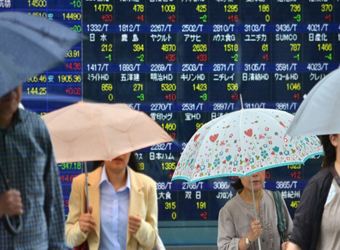Stocks in Asia notched gains on Wednesday after Wall Street closed at record levels following comments about tax reform and fading investor fears.
Japan’s Nikkei 225 rose 0.39 percent on the softer yen. Major exporters extended gains made in the previous session, with automakers, banks and most tech companies trading higher.
Across the Korean Strait, South Korea’s benchmark Kospi index erased earlier losses to climb 0.08 percent.
Down Under, the S&P/ASX 200 tacked on 0.45 percent, with the materials sub-index leading gains in the morning. Bank stocks were mostly higher: National Australia Bank was up 0.91 percent and ANZ was 0.97 percent higher.
Greater China markets bucked the trend to trade mostly lower. Hong Kong’s Hang Seng Index fell 0.6 percent, looking to break a three-day win streak. The Shanghai Composite edged down 0.14 percent, while the Shenzhen Composite traded just 0.035 percent above the flat line.
“Financial markets seem to have abruptly stopped worrying about the end of the world,” said Rob Carnell, Asia head of research at ING, in a note.
U.S. Treasury Secretary Steven Mnuchin said Tuesday that tax reform could be backdated to Jan. 1, 2017 as it would be a “big boon for the economy.” Mnuchin also told CNBC that the Trump administration was “super focused” on ensuring tax reform would be completed by the end of the year.
Mnuchin’s comments also supported the rise in U.S. Treasury yields, which climbed on data releases stateside. Yields of the 10-year U.S. Treasury note stood around 2.17 percent on Tuesday, having risen from the 2.13 percent seen on Monday.
Meanwhile, the dollar clung onto Monday’s gains made against a basket of major currencies. The dollar index stood at 91.876 at 9:43 a.m. HK/SIN. Against the yen, the greenback held above the 110 level hit overnight to last fetch 110.15 yen.
“With no major U.S. economic reports released [Tuesday], the gains in the greenback were driven by the continued rise in U.S. yields,” Kathy Lien, managing director of foreign exchange strategy at BK Asset Management, said in a note.
Indexes on Wall Street closed at record levels, with the Dow Jones industrial average rising 0.28 percent, or 61.49 points, to close at a record 22,118.86.
Risk sentiment likely improved as immediate concerns over geopolitical tensions on the Korean Peninsula faded. The United Nations Security Council on Monday imposed tougher sanctions on North Korea, including a cap on oil imports. In response, the hermit state on Tuesday rejected those sanctions and said the U.S. would “suffer the greatest pain.”
Markets were also supported as damage caused by a downgraded hurricane in Florida looked to be lesser than originally thought.
In currencies, the pound firmed after U.K. August inflation rose 2.9 percent compared to one year ago, a tad higher than the 2.8 percent forecast by economists in a Reuters poll. The release of inflation data came ahead of the Bank of England’s interest rate decision on Thursday in the U.K.
Sterling extended gains to trade at $1.3303 at 10:03 a.m. HK/SIN after strengthening as high as $1.3294 during the overnight session.
Apple suppliers in Asia were in focus during the session after Apple unveiled its newest iPhone model — the iPhone X — at a product launch on Tuesday. Apple stock closed 0.4 percent lower on Tuesday.
South Korean memory chip maker SK Hynix surged 2.41 percent and Samsung Electronics rose 1.37 percent. Apple suppliers in Taiwan were under pressure, with lens supplier Largan Precision falling 3.84 percent. Hon Hai Precision Industry, which assembles Apple iPhones, lost 0.85 percent.
On the energy front, oil prices were steady after rising overnight. U.S. crude edged up 0.06 percent to trade at $48.26 a barrel and Brent crude slipped 0.18 percent to trade at $54.17. The moves higher followed an OPEC report that said oil demand would pick up in 2018, Reuters said on Tuesday.
Source: CNBC


